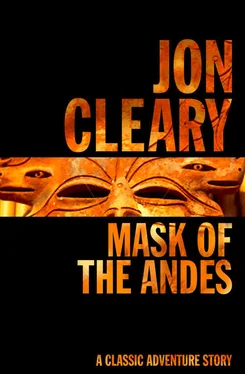Jon Cleary - Mask of the Andes
Здесь есть возможность читать онлайн «Jon Cleary - Mask of the Andes» — ознакомительный отрывок электронной книги совершенно бесплатно, а после прочтения отрывка купить полную версию. В некоторых случаях можно слушать аудио, скачать через торрент в формате fb2 и присутствует краткое содержание. Жанр: unrecognised, на английском языке. Описание произведения, (предисловие) а так же отзывы посетителей доступны на портале библиотеки ЛибКат.
- Название:Mask of the Andes
- Автор:
- Жанр:
- Год:неизвестен
- ISBN:нет данных
- Рейтинг книги:5 / 5. Голосов: 1
-
Избранное:Добавить в избранное
- Отзывы:
-
Ваша оценка:
- 100
- 1
- 2
- 3
- 4
- 5
Mask of the Andes: краткое содержание, описание и аннотация
Предлагаем к чтению аннотацию, описание, краткое содержание или предисловие (зависит от того, что написал сам автор книги «Mask of the Andes»). Если вы не нашли необходимую информацию о книге — напишите в комментариях, мы постараемся отыскать её.
Mask of the Andes — читать онлайн ознакомительный отрывок
Ниже представлен текст книги, разбитый по страницам. Система сохранения места последней прочитанной страницы, позволяет с удобством читать онлайн бесплатно книгу «Mask of the Andes», без необходимости каждый раз заново искать на чём Вы остановились. Поставьте закладку, и сможете в любой момент перейти на страницу, на которой закончили чтение.
Интервал:
Закладка:
JON CLEARY
Mask of the Andes

Contents
Cover
Title Page JON CLEARY
Chapter One
Chapter Two
Chapter Three
Chapter Four
Chapter Five
Chapter Six
Chapter Seven
Chapter Eight
Chapter Nine
Chapter Ten
Chapter Eleven
Keep Reading
About the Author
Also by the Author
Copyright Page
About the Publishers
Chapter One
1
McKenna straightened up from laying out the catch of fish and looked out across the lake. On the far side of the bright blue pan of water the mountains rose like crumpled iron, cold to the eye and the soul: gods as well as men had died in these ranges. Through a gap he could see the glacier, a white cataract frozen forever, coming down from the highest snowcapped peaks that stood against the stark sky. At this height in the Andes, McKenna could never think of the sky as being gentle. That was for less harsh climes, for other times, the sky of boyhood memory.
‘Padre—’ Agostino Mamani was fifteen, but no longer a boy. Here on the Bolivian altiplano, the Indian peasant, the campesino, was fortunate if he lived beyond forty: one could not waste too many years in childhood. ‘I have to go down to San Sebastian today.’
‘Why do you have to go, Agostino?’ San Sebastian was ten miles by road and 2,000 feet in altitude below the lake; it was not just a city but another world to the campesinos of Altea, the village half a mile down from the lake. ‘When did you last go to the city?’
Agostino shrugged: time was a dimension he did not understand. ‘A long time, padre. I was—’ He held out his hand opposite his hip; short and squat, no more than an American child’s height even now, he said, ‘I was just a small boy.’
‘Why do you have to go today?’
‘My mother has to see the doctor at the hospital.’
‘Has she been ill?’ McKenna remembered that he had not seen Agostino’s mother for almost a month. She was one of the more cheerful, intelligent and approachable of the village women, a plump bundle made even plumper by her voluminous skirts, a woman whose one sin, until recently, had been her vanity about her hats. Vance Packard’s status-seeking society had its pockets of competition even up here on the altiplano; poverty was no bar to conceit. Any campesino woman who had a different hat for each day of the week, as Maria Mamani had, had a top rating in Altea. The Joneses, McKenna had wryly noted, were a widespread family: everyone everywhere was trying to keep up with them. ‘Maybe I could drive you and your mother down in the Jeep? It would be no trouble.’
Agostino scratched a bare toe in the rocky earth. His flat, dark face lost all expression, became the mask that McKenna knew so well and hated so much. Sometimes, in his wilder moments of depressed fantasy, he imagined he was surrounded only by masks, that behind the dark faces of the Indians there were no skulls, no brains, nothing. ‘My mother and I will catch the bus, padre.’
McKenna recognized he was being shut out, but he persisted. Back home in California, though never shy, he had always been careful of other people’s reticences; Americans, though the most confessional of people, could be violently jealous about those things they did not want to expose. But a missionary could not afford such courtesies. He had come to know, a little too late perhaps, that a missionary, if he was to be a successful one, had to be something of a busybody. Besides, he always had the feeling he was doing too little for the campesinos, that if he could not help them more than they had so far allowed him to, he might as well pack up and go home. So he forced his help on them, grabbing at straws: even the offer of a lift in the Jeep would be a plus mark in the day’s good works.
‘That’s crazy, Agostino. The bus is always full and it’s so – so dangerous.’ He knew that was no argument at all; the campesinos boarded the ancient rickety buses with a stoic disregard of the fact that they might never complete their journey. He tried another tack: ‘If your mother is ill, she would be more comfortable in the Jeep.’
‘No, padre.’ His face still closed, Agostino stared out across the lake.
McKenna was about to give up, but tried once more. He had had a sudden thought and he could hear the disappointment in his voice as he asked, ‘Is she going to have a baby, Agostino? Is that why she is going to the doctor?’
‘I don’t know, padre.’ Agostino was not embarrassed by the question; in the two-room adobe hut that was home, the facts of life had never been a secret to him. ‘How should I know that?’
McKenna gazed at the young Indian, but the mask was shut against him: Agostino was going to tell him nothing. He turned and looked out at the lake again, wondering, as he had so many times since coming here nine months ago, if and when he would ever be fully accepted by the Indians. Dear God, he prayed, why did you make the bastards so sullen? For Christ’s sake, as the saying goes, inject them with a little of the grace of co-operation.
He continued to stare out across the lake, trapped, as he always was, by his inability to walk away from an unresolved situation. Maybe, he thought, only the successful can make exits. His father had been a successful man and had made successful exits, from Bolivia, from his family, from life. He had got out of Bolivia when the price for silver was high and foreigners had still been tolerated. He had walked out on his wife and children while he was still virile enough to attract other women. And he had exited from life with a panache that his son could never hope to equal: he had plunged into San Diego harbour in his private plane on a day when the stock market had hit an all-time peak. Only failures, McKenna thought, stumble around looking for ways out.
So he stared at the landscape, seeking distraction in it while he hoped Agostino would move off up to the mission. He heard the dull boom as the fishermen out on the lake dynamited for fish; then he saw the cauldron of water bubble up between the three boats. He never dynamited for fish himself and he wished the local Indians had never discovered the method; there were two men in the village who had stumps for arms and he was always expecting a major tragedy, two, three or half a dozen deaths. The water settled and the boats moved in to collect the stunned and dead fish as they floated to the surface.
A flight of coots planed down towards the water, a black arrowhead that was suddenly studded with bright coral as the birds turned and the still-rising sun caught their vivid feet. An Andean gull, an intruder in the totora rushes where the coots built their nests, rose up and winged away in the gust of wind that abruptly slapped at the lake’s surface. McKenna saw the three small fishing boats, all of them made from totoras, rock violently.
He turned to Agostino, who had not moved. ‘You better tell your father and others to come in,’ he said, his voice sharper than he had intended. Damn the kid, why did he have to make things so difficult?
Agostino looked out at the three men, each of them alone in his frail craft. ‘A son does not tell his father what to do, padre.’
McKenna sighed, gave up: his Irish father had had exactly the same philosophy. ‘Okay, Agostino, you win.’
For a moment the boy’s mask broke; he looked puzzled. McKenna, trying to struggle out of the web of talk, mutely waved to him to pick up the fish and take it up to the mission. The Quechua language, which McKenna had taken such pains to re-learn, had its own wry notes, but he still found conversation with the Indians had its limitations. At times he felt it was like walking on loose snowshoes across a field of chilled custard. Or like talking to his own mother.
Читать дальшеИнтервал:
Закладка:
Похожие книги на «Mask of the Andes»
Представляем Вашему вниманию похожие книги на «Mask of the Andes» списком для выбора. Мы отобрали схожую по названию и смыслу литературу в надежде предоставить читателям больше вариантов отыскать новые, интересные, ещё непрочитанные произведения.
Обсуждение, отзывы о книге «Mask of the Andes» и просто собственные мнения читателей. Оставьте ваши комментарии, напишите, что Вы думаете о произведении, его смысле или главных героях. Укажите что конкретно понравилось, а что нет, и почему Вы так считаете.












